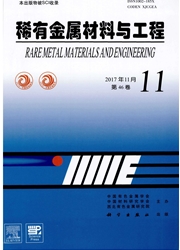

 中文摘要:
中文摘要:
将高温自蔓延反应原理应用于废旧阴极射线管(CRT)的处理,采用镁和氧化铁作为热剂,研究了废弃CRT玻璃高温自蔓延烧结合成玻璃陶瓷的可行性,考察了Fe2O3-Mg—CRT玻璃自蔓延体系的反应特性,探索了不同物料配比时燃烧波的传播规律。结果表明,系统维持自蔓延的CRT玻璃最大加入量为70%(质量分数,下同):燃烧波传播速率为0.5~6.5mm/s,温度为1000~2000℃;两者均随CRT玻璃的加入量增加而呈线性降低。高温自蔓延合成样品主要构成相为玻璃陶瓷,可以实现铅的有效固定,处理后样品中铅的环境浸出率远小于相关国内和国际环境标准。
 英文摘要:
英文摘要:
The feasibility to reuse hazardous waste CRT glass by self-propagating high-temperature synthesis(SHS) was investigated, where Mg and Fe2O3 was adopted as reagents. Combustion wave transportation and final products of SHS for CRT recycling were studied in detail. It was shown that the maximum CRT glass content is about 70%, combustion wave velocity is 0.5-6.5 mm/s and combustion temperature is 1000-2000 ℃. Both of the combustion wave velocity and temperature decrease linearly with the increase of CRT glass content. Results of XRD and SEM showed that samples after SHS are mainly consisted of glass ceramic composite, in which Pb and Ba could be solidified and stabilized effectively. The concentration of Pb and Ba samples after SHS according to the toxicity characteristic leaching procedure(TCLP) is much lower than the threshold values for hazardous wastes regulated by domestic and international environmental standards.
 同期刊论文项目
同期刊论文项目
 同项目期刊论文
同项目期刊论文
 Lead recovery and the feasibility of foam glass production from funnel glass of dismantled cathode r
Lead recovery and the feasibility of foam glass production from funnel glass of dismantled cathode r 期刊信息
期刊信息
